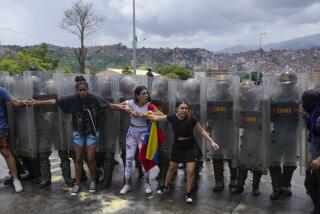Foes Try to Thwart Yeltsin Presidential Victory : Soviet Union: The republic’s Communist Party is hoping to force a runoff in the election.
- Share via
MOSCOW — The conservative Russian Communist Party, faced with the almost unbeatable bid of the radical populist Boris N. Yeltsin to become president of the Soviet Union’s largest republic, is hoping to spoil that victory by forcing him into a runoff and thus demonstrate that his support is not universal.
While virtually conceding that Yeltsin will win the presidency to become the Russian Federation’s first popularly elected leader, party officials predicted Monday that the four other candidates would deprive him of the 50% he needs for an outright victory on the first ballot.
With two strong candidates, former Prime Minister Nikolai I. Ryzhkov and onetime Interior Minister Vadim V. Bakatin, running as Communists against Yeltsin, the party is prepared to see who does better against Yeltsin and then back that individual in the second round of voting in order to diminish Yeltsin’s probable victory.
This spoiler strategy, outlined by party officials during a press conference on Monday, reflects both the party’s weakness and Yeltsin’s immense popularity in advance of the initial round of voting, scheduled for June 12.
“We can concentrate efforts in support of our candidate in the second round,” said Stanislav A. Osminin, first secretary of the Kirov regional party committee in Siberia. “It would have been bad if we had come up with only one candidate for the first round and he then had a poor rating with the voters.”
Much depends on the election, for the size of Yeltsin’s expected victory will determine the scope and speed of further political and economic reforms not just in Russia but throughout the Soviet Union.
Viktor I. Beregovoi, second secretary of the Bryansk regional party committee, made clear the party’s hopes for Bakatin, a popular liberal who was ousted as interior minister after conservatives complained that he had failed to check growing pro-independence nationalism among the country’s republics.
But Beregovoi, just as plainly, said that Yeltsin was the probable winner.
Anatoly M. Leontev, chairman of the Chuvash Supreme Soviet in one of Russia’s autonomous regions, said that the Russian party, regarded as grouping the most conservative elements in its leadership, had supported Ryzhkov but that many now felt that Bakatin was a better candidate against Yeltsin in a runoff.
“Yeltsin can’t do it in one round,” Leontev said. “Then we can focus our efforts in the second. Having only a single candidate to oppose him would have been bad. When there are three or four, the balance of forces changes.”
Air Force Col. Alexander Rutskoi, a hero of the Soviet war in Afghanistan, whom Yeltsin selected over the weekend as his vice-presidential running mate, gave a taste of the likely campaign on Monday, calling Ryzhkov a “political has-been who has already proved his incompetence.”
“Ryzhkov had a long time, with all the powers he needed, to show whether he had the capacity to be a good leader and a good manager,” said Rutskoi, who remains an active party member. “He failed, and I think it is indecent of him to run for the presidency.”
The Russian Congress of People’s Deputies, the parliament of the Russian Federation, will meet today to create the powerful executive presidency for which Yeltsin won voter approval in March and which he will seek next month.
Establishment of the post will require a major governmental restructuring, and extensive constitutional amendments must be enacted by the Congress by a two-thirds majority. The Congress, which will continue through this week, is expected to be the opening forum for the three-week presidential campaign.
Although the Russian Communist Party opposed giving additional powers to Yeltsin and tried in March to remove him from his post as chairman of the Russian Supreme Soviet, the republic’s legislature, it has apparently decided against further opposition to creation of the presidency or attempting to delay the election until the autumn.
“We have no mandate (from the party) to hold things up,” Beregovoi said. “I do not see any delay in the election unless the majority of candidates ask for more time to prepare their campaigns, and that would not be necessary, as most are well-known.”
One issue that will be fought over, however, is the requirement in draft legislation that would force anyone elected president to suspend his membership in any political party while in office so that he would not be subject to party orders.
Yeltsin’s supporters, the coalition known as Democratic Russia, and deputies belonging to the hard-line Communists of Russia are about balanced in the Congress, with an important swing vote in the center.
Russia’s central election commission on Monday approved the candidacies of Yeltsin, 60, and his vice-presidential running mate, Rutskoi, 44, who has formed a new group, Communists for Democracy, within the party; Ryzhkov, 61, and his vice-presidential nominee, Army Col. Gen. Boris Gromov, 46, the last Soviet commander in Afghanistan, and Bakatin, 51, who is now a member of the National Security Council, and his running mate, Ramazan Abdulatipov, the chairman of one of the two houses of the Russian legislature.
The commission also approved the candidacy of army Gen. Albert Makashov, a hard-line opponent of President Mikhail S. Gorbachev’s political and economic reforms, and his running mate, Alexei A. Sergeyev, a conservative economist, and that of Amangeldy Tuleyev, chairman of the Kemerovo regional executive committee in Siberia, and his running mate, Viktor Bocharov, head of a building enterprise there.
A sixth candidate, Vladimir Zhironovsky, the leader of the small Liberal Democratic Party, must win the support of a fifth of the deputies to go on the ballot. The commission rejected three candidates as improperly nominated.
More to Read
Sign up for Essential California
The most important California stories and recommendations in your inbox every morning.
You may occasionally receive promotional content from the Los Angeles Times.













